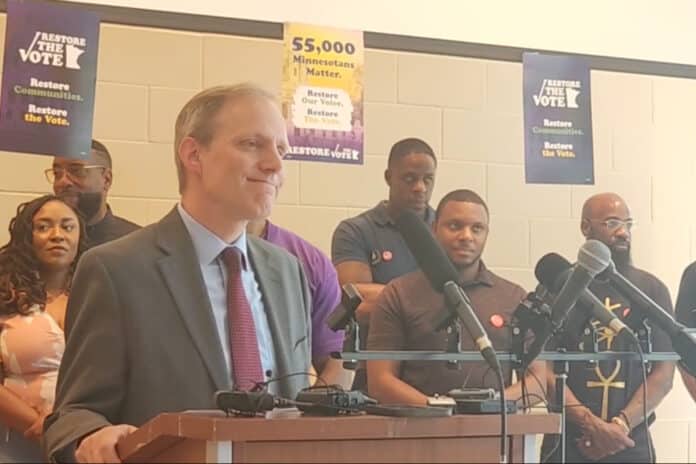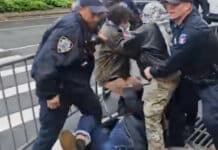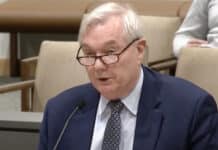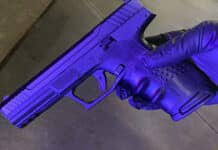
Everything was rolling along smoothly at a press conference in St. Paul on Thursday morning where Secretary of State Steve Simon gathered with felon voting rights restoration activists and a handful of legislators to celebrate the June 1 enactment of a new law that restores voting rights to an estimated 55,000-plus Minnesotans serving probation or parole for a felony crime.
The bill passed in both chambers of the legislature three months ago, with Gov. Tim Walz signing it on March 3. The new law came into effect at midnight on Thursday. It restores voting rights to felons once they are released from incarceration. Previously, state statute barred felons from voting until they completed their entire sentence, including probation and parole.
Simon, who championed HF28 at the outset of the 2023 legislative session, held up and handed out a roll of red, circular “I WILL VOTE” stickers to those on hand who ceremonially registered to vote on site just hours after the law took effect across the state.
“We don’t know of another time in modern history that so many voters immediately, with the strike of a clock at midnight, were automatically given the right to vote,” Simon said to applause from a number of supporters gathered at the event, which was organized by Restore the Vote Minnesota, a coalition of nonprofit organizations and professional associations and unions.
The event was held at the Arlington Hills Community Center on St. Paul’s East Side, where community organizers set out to begin canvassing the neighborhood letting residents know of the new law.
Simon and other speakers took turns celebrating the moment and explaining the technical changes in the voter registration language that now allow for felons who are no longer incarcerated but still serving probation to vote. They also spoke to the efforts that many community organizers and their partners plan to make over the next several months to raise awareness of the new law and attempt to reach thousands of formerly incarcerated Minnesotans “newly enfranchised” to vote.
Restore the Vote and its coalition of allied organizations will utilize volunteers and hire professional canvassers to continue outreach throughout the summer and into 2024, said Antonio Williams, a director for a nonprofit that has advocated for the legislation. Williams was one of several formerly incarcerated people still serving parole who became eligible to vote on Thursday.
“We are going to have to break through some barriers, break through some justified fear of being attacked and threatened, being lied to,” by people who don’t think they should be able to vote, said Williams, to cheers and applause. “That is why we are the credible messengers who will be going out and doing this work.”
Simon: ‘I’m just not sure’ if incarcerated people should be able to vote
Then the room got quiet after a member of the media asked Secretary of State Simon whether Minnesota should take another step and join Maine, Vermont and Washington, D.C. in amending its laws to allow currently incarcerated people to vote.
“That’s really more of a question for the legislators,” Simon said, as some of the activists standing behind him nodded and responded “yes” to the reporter’s question.
“Do you support it?” the reporter asked the DFL secretary of state.
Simon tilted his head slightly. “I’m not sure, to be honest. And that’s my honest answer. I’m just not sure.”
“You’ve got two legislators here, what are your thoughts on it?” the reporter asked, prompting Rep. Cedrick Frazier, DFL-New Hope, to relieve Simon at the podium.
Frazier, who carried HF28 in the House and intimated during a House floor debate in February that the legislation didn’t go far enough, all but said “yes” to the reporter’s question.
“I think we should absolutely look at ways and how we can always make sure that democracy includes every voice, no matter where they are,” Frazier said. “So that is my answer to that question and we will continue to have that conversation in the legislature.”
It’s not the first time this year DFL legislators have brought up the desire to see voting rights restored for all felons, whether they’re in prison or on probation.
In February, Rep. Andy Smith, DFL-Rochester, called for Minnesotans to support “universal suffrage.”
“I think all those citizens should have the right to vote,” Smith said in a Feb. 2 House floor debate over HF28. “Voting is not a cudgel to punish, but it’s a fundamental human right in our democracy. Right now in Minnesota there are 8,152 souls incarcerated in Minnesota. Each of them have dreams and goals … and they have no voice in this democracy.”
Republicans have criticized the legislation saying that Minnesota’s incarceration rate is half the national average, and that many convicted of felonies aren’t actually spending any time in prison.
“We’ve heard phrases like, ‘Folks who are returning to society,’ ‘People who have served their time,’” said Rep. Anne Neu Brindley, R-North Branch, during the floor debate over the bill. “We’ve heard the phrase, ‘When they are released.’ We’ve heard lots of these phrases, but here’s the problem: In the state of Minnesota, many of these people never serve time.”
Hank Long
Hank Long is a journalism and communications professional whose writing career includes coverage of the Minnesota legislature, city and county governments and the commercial real estate industry. Hank received his undergraduate degree at the University of Minnesota, where he studied journalism, and his law degree at the University of St. Thomas. The Minnesota native lives in the Twin Cities with his wife and four children. His dream is to be around when the Vikings win the Super Bowl.
















